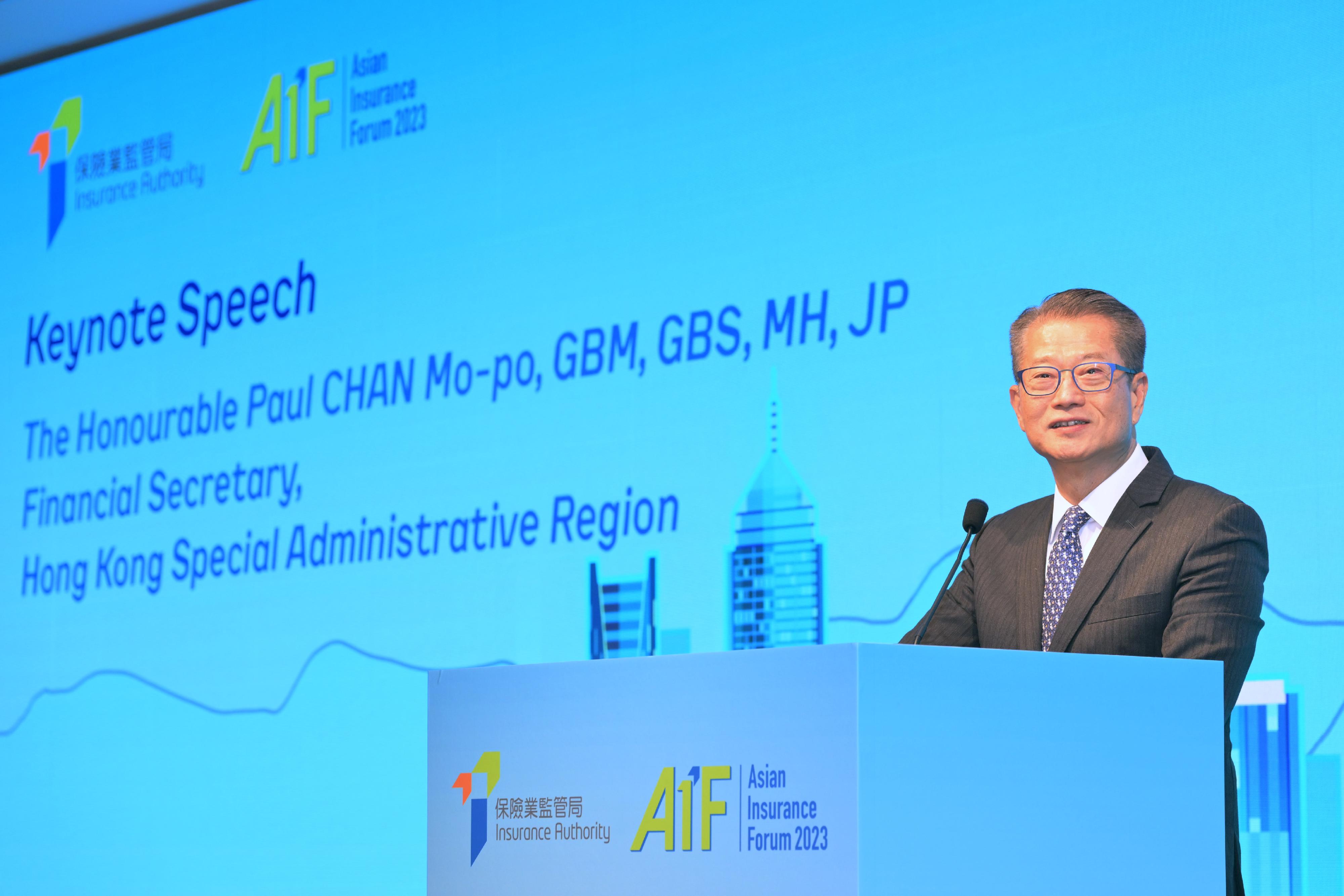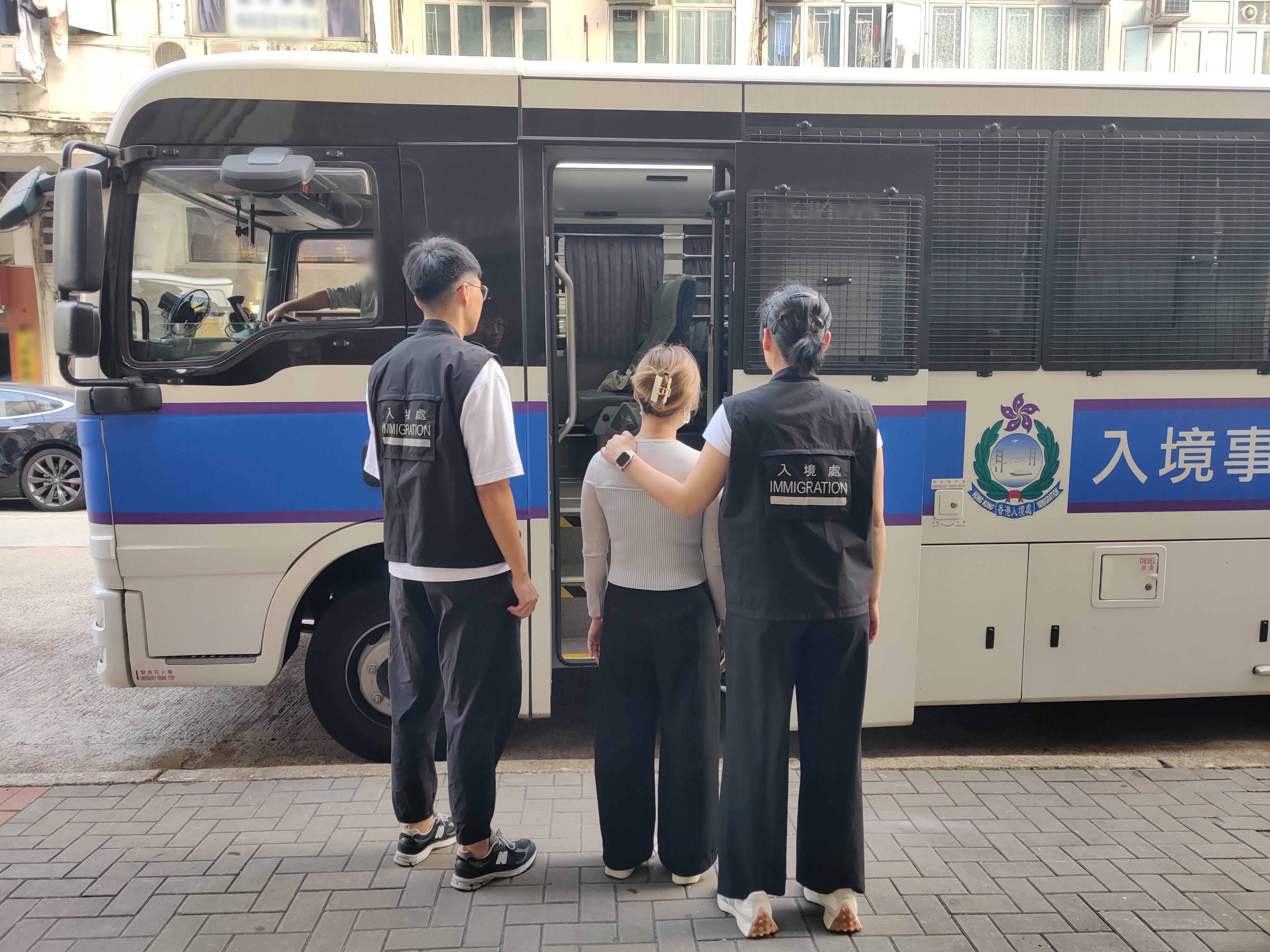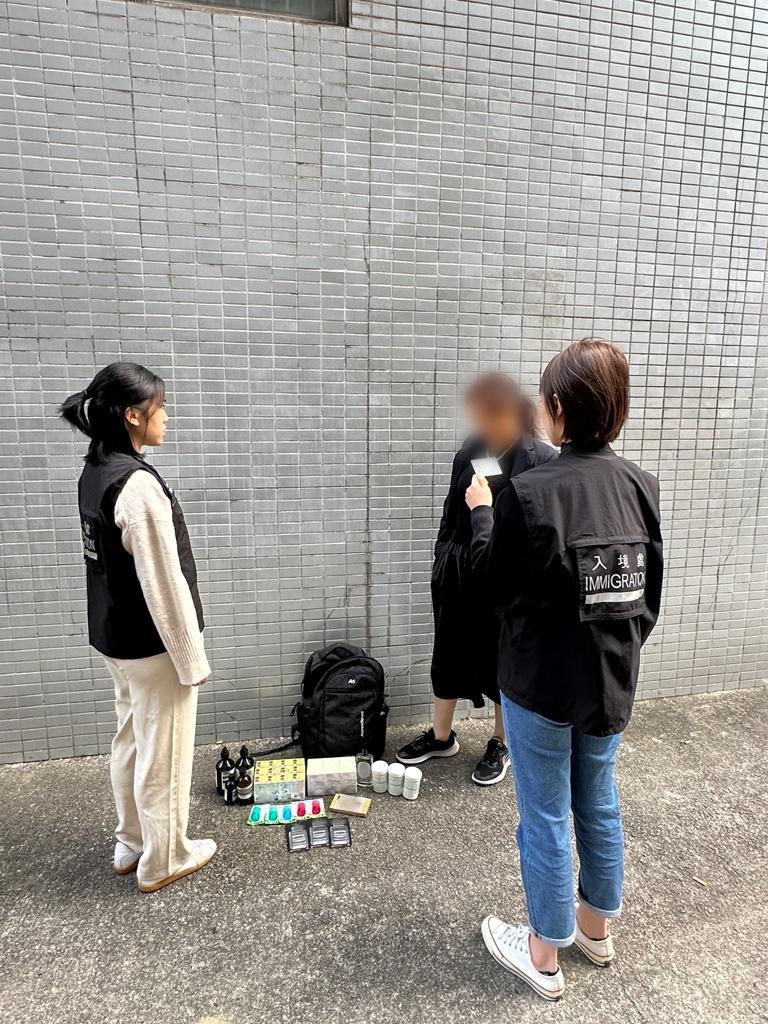Speech by FS at Asian Insurance Forum 2023 (English only) (with photo/video)
Following is the speech by the Financial Secretary, Mr Paul Chan, at the Asian Insurance Forum 2023 today (December 8):
Stephen (Chairman of the Insurance Authority, Mr Stephen Yiu), Clement (Chief Executive Officer of the Insurance Authority, Mr Clement Cheung), distinguished guests, ladies and gentlemen,
Good afternoon. It is a pleasure to be here, with you, for this year’s Asian Insurance Forum. I hope you’re enjoying this lunch break after today’s full morning session. I am sure there’s much more to come this afternoon.
This high-level forum serves as an inspiring platform for exchange of ideas on many issues relevant to the insurance industry. From the current state of the global financial markets, to ESG (environmental, social, and governance) and DEI (diversity, equity and inclusion), and from insurance’s interface with Web3, to Hong Kong’s prospect as a risk management centre, I am sure this forum is a much enlightening occasion that will drive new ideas, collaboration and businesses.
The theme of the forum is “Striving for Enhanced Global Financial Stability and Resilience”. The Chief Executive and many distinguished speakers have shared their insightful perspectives on a wide range of issues. Now, please allow me to take some time to update you on how Hong Kong is doing on our financial stability and resilience, and share some observations about the development of Hong Kong’s insurance industry.
As it nears the end of a momentous year, the world has found itself in a challenging global environment filled with complexities and tensions: slower global economic growth; higher-for-longer interest rates; supply chains being disrupted and reshaped by geopolitical fragmentation.
Hong Kong’s commitment to financial stability
Despite these challenges, we remain highly confident about the financial stability of Hong Kong. Over the years, we have withstood trials and tribulations time and again. We have worked unceasingly to build a robust regulatory framework and strong buffers, maintaining a high degree of resilience to shocks.
To this end, we have established a high-level “cross-market, co-ordinated, and round-the-clock” monitoring system, covering all sectors of the financial market, so that we could detect looming risks. And I am glad to tell you that despite the volatility in the financial markets, there has been no untoward volatility.
Building resilience through development
But beyond maintaining the stability and security of the financial system, it is through consistently developing and enhancing our financial markets that we could strengthen our resilience.
And we know that in a highly competitive world of finance, we must never stop improving and reinventing ourselves so as to stay ahead of the competition.
Our work on this front is multifaceted. You may well be aware of the establishment of a task force to boost the liquidity of the stock market by a combination of measures. They include bringing enhancements to our listing regime, market structure, trading mechanism, mutual market access arrangements with the Mainland, and attracting both international and Mainland capital and issuers to Hong Kong.
In particular, our Connect Schemes with the Mainland have been expanding and deepening. Now they have extended from products to more derivatives, covering stocks, bonds, ETFs (exchange-traded funds) and risk management products, like interest rate swaps and A50 index futures. Just a couple of weeks ago, we announced that China treasury bond future contracts will be launched in Hong Kong.
As Renminbi (RMB) is getting more popular as a trade, settlement and reserve currency, we are working very hard to further enhance our offshore RMB business hub status, by offering more products and risk management tools to enrich our ecosystem and, at the same time, upgrade the related infrastructure.
We are also making great strides to open up new markets to attract new capital and new issuers. The ASEAN (Association of Southeast Asian Nations) and the Middle East are burgeoning, and they have both set out plans to modernise their infrastructure, pursue green transition and develop the digital economy. They are also seeking to diversify their sources of investments and markets for their products.
With the concerted efforts of the Hong Kong team and the cordial response from these counterparts, we are seeing heartening results. Last week, the first ever Saudi Arabia ETF was listed on the Hong Kong Stock Exchange. This week – indeed yesterday and today – we are hosting the first ever Priority Summit in Asia organised by the Saudi Arabia-based FII (Future Investment Initiative) Institute. Prominent figures from Saudi Arabia and around the world, in their speeches and interviews with media, have all recognised the unique attractiveness of Hong Kong as the leading international financial and business centre in this part of the world converging capital, investors and talent from both the East and the West.
Some latest developments of Hong Kong’s Insurance Industry
Now allow me to share some observations about the development of the insurance industry in Hong Kong.
We are among the world’s most open insurance centres. Seven of the top 10 insurers globally conduct their business here. The average gross premium was over $550 billion on average over the past few years. In 2022, the industry accounted for 3.6 per cent of the GDP (Gross Domestic Product) in Hong Kong.
And after some setback in 2022, the insurance industry is seeing strong rebound this year. In the first three quarters of 2023, new office premiums of long-term business recorded an increase by more than 30 per cent compared to the same period last year. The increase in demand for whole life and critical illness protection was particularly impressive.
These figures demonstrate that the insurance industry has been coping well with the myriad of challenges and changes. And they also show the promising prospects of Hong Kong’s insurance industry on the Mainland, in particular the Greater Bay Area (GBA). We will continue to work with the Mainland authorities to assist the insurance industry to open up more business opportunities in the GBA.
And here, allow me to highlight a few developments which may characterise the local industry’s development in the future: innovation and technology, climate change, and the social value of insurance.
Innovation and technology for insurance
On technology and innovation, we have witnessed disruption brought by insurtech, as traditional insurers seek deeper co-operation with fintech start-ups and technology providers to develop new product and tools, or even new business models to service various aspects of the insurance value chain. Since we introduced the virtual insurance regime in 2017, we have thus far licensed four virtual insurers, and their businesses have been expanding. In 2022, the businesses of the virtual insurers in Hong Kong expanded by 2.5 times compared to the previous year. And increasing digitalisation has driven about 80 per cent of insurers in Hong Kong to utilise digital channels to enhance business operations.
And virtual insurers are exploring new frontiers, for example, offering products in areas that may be left out previously by traditional insurers, like coverage for pets including dogs, cats and turtles. And what’s more, with digital native edge, some virtual insurers are taking further steps to innovate niche products such as cyber insurance for virtual assets. Certainly, with the greater popularity of Web3, there will likely be ample space for cybersecurity insurance as new types of risks are emerging. Trends have shown that such business is increasingly shifting from the traditional coverage of hardware damage and business disruption to cover more third-party risks on data leakage, litigation costs and public liabilities.
Tackling climate change
On climate change, the World Economic Forum has warned that climate and environmental risks are the core focus of global risk perceptions over the next few decades, but they are also the risks for which we are least prepared.
At a global scale, natural catastrophe events caused US$270 billion of economic losses last year, but only 44 per cent of such risks was insured. In Asia, we face a much larger natural catastrophe protection gap of over 80 per cent compared to the rest of the world. Intensified natural disasters have increased insurance and reinsurance costs, creating significant rise in the demand for alternative risk transfer to supplement the traditional reinsurance market.
That is why we are keen on developing the insurance-linked securities, or ILS market, which can play an effective role in offloading underwritten risks to the capital market. While the global ILS market has been growing steadily over the past decade, the proportion of natural catastrophe risks covered by ILS remains small, and this market in Asia, including the Mainland, is very much underdeveloped.
I think you know this well: with the concerted efforts of the Government, the Insurance Authority and the industry stakeholders and our Mainland and overseas partners, we have so far issued four catastrophe bonds totalling US$560 million. That includes our recent issuance of catastrophe bonds for Chile in collaboration with the World Bank. It was also the first ILS product listed on the Hong Kong Stock Exchange.
Unleashing the social value of insurance
Finally, it is the social value of insurance. Let us not forget that insurance is an “economic shock absorber” and a “stabiliser for social harmony”, which are important and fundamental roles that it should play in the community.
We are fully conscious of this undertaking. For instance, in 2019, the Government and the insurance industry worked together to launch two tax-deductible insurance products, the Voluntary Health Insurance Scheme and the Qualifying Deferred Annuity Policies, to encourage uptake of health insurance policy and early retirement planning. Both products have met with overwhelming response, with over 1 million and 260 000 policies issued respectively.
The momentum was reinforced by the Protection linked plan (PLP) launched in 2022. With simple product structure, reasonable mortality protection, and transparent fee structure, the PLP seeks to encourage the younger generation to start their retirement planning early, so as to narrow the protection gap and facilitate financial inclusion.
Concluding remarks
Ladies and gentlemen, before I close, I wish to take this opportunity to express my sincere appreciation to the Insurance Authority for organising this foremost platform of open and constructive dialogue, shaping a brighter future for the Asian insurance market.
My gratitude also goes to each and every one of you, for the remarkable contributions you have made, and will make, to the development of the insurance industry in such vital roles of transforming risks into opportunities, promoting innovation and offering protection to the society.
With the holiday season upon us, I wish you all a very merry Christmas and the best of health, happiness and love in the new year. Thank you.





